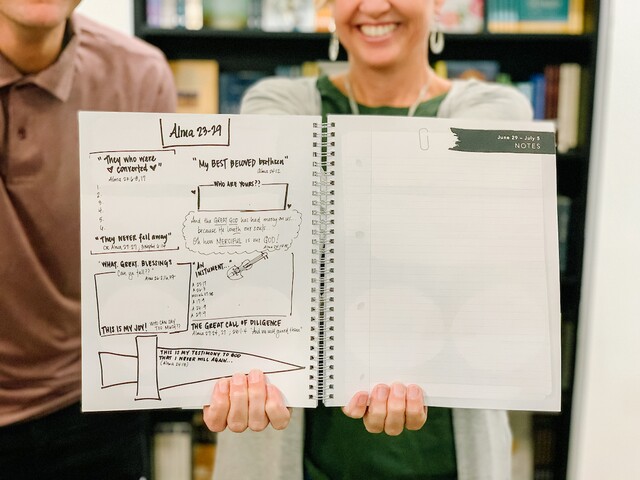This story appeared in the November/December 2020 issue of LDS Living magazine.
David Butler and Emily Belle Freeman had the same crazy idea—they just didn’t know it.
It was 2010, and Butler had been teaching his seminary class about the pioneer John Moyle, a stonemason recognized for carving “Holiness to the Lord, House of the Lord” on the exterior of the Salt Lake Temple. Moyle worked on the temple for 20 years, walking to the site on foot even after one of his legs had to be amputated due to an accident.
One night in her home, Freeman had been studying the same story and thought there would be no better way to honor Moyle than to walk to the temple herself. Little did she know, her son's seminary teacher had the exact same thought, which her son revealed to her after she started trying to put her plan into action.
It wasn't long before Freeman and Butler persuaded about 85 other people to participate in a temple walk from the Draper Utah Temple to the Salt Lake Temple.
It was on this trip that the two teachers discovered one very important thing.
“We both found out that we love the Lord, we love the scriptures, we love teaching them, and we love bringing other people along,” Butler says.
That was 10 years ago. Since then, Freeman and Butler have collaborated on a number of projects, including their book “The Peter Potential,” a Bible study non-profit called Multiply Goodness, "walking firesides," and anything in between that brings people together to talk about the gospel.
A Worldwide Community
One of Freeman and Butler’s most well-known projects is “Don’t Miss This,” a weekly video YouTube series where they share their insights from Come, Follow Me. With over 145,000 subscribers, the videos have taken off since the channel was launched just in time for the Church’s study of the New Testament in 2019. The pair also has over 92,000 Instagram followers and has written study guides to help Latter-day Saints dive in and truly learn from the scriptures.
Now, as Freeman and Butler wrap up their in-depth study of the Book of Mormon, they’re already busy preparing for next year’s Come, Follow Me, which will focus on the Doctrine and Covenants.
But in the beginning, “Don’t Miss This” happened quite by accident. At the time, a handful of people had been asking Freeman and Butler what their plans were for Come, Follow Me, since Freeman and Butler teach seminary and institute. After some discussion, the two decided to record a lesson and put it up on YouTube just a couple of days before the start of 2019.
That was all it took. Two weeks later, “Don’t Miss This” had grown into a community, and over the months that followed, that community grew around the world. From single adults and empty nesters to soldiers in Afghanistan and Sunday School classes in prison, thousands of Latter-day Saints have been checking in with “Don’t Miss This” to learn about and discuss the gospel.
The ability to teach viewers worldwide is one of the things Freeman and Butler love most about “Don’t Miss This.” But with their busy schedules as teachers, neither of them has much time to devote to creating a detailed plan for each video. Instead, most of the production happens on the fly, with barely enough time for a weekly phone call on Mondays where Freeman and Butler talk about their favorite parts of Come, Follow Me before filming for the week.
“I think the biggest obstacle is finding a time where both of us can be in the same place at the same time,” says Freeman. “And usually ... there is only one block of time and it just miraculously works for both of us. It’s not the same every week.”
Aside from the weekly phone call, the rest of the magic happens spur-of-the-moment. While walking down the stairs to Freeman’s basement where they film, Freeman and Butler divvy out who will take what portion of each lesson. They also don’t do extra takes or edit the clips, recording two lessons at a time and changing outfits between sessions to make the videos stand apart from each other.

There are moments when the scale of their project can be intimidating, especially when Freeman or Butler have vacations or other commitments that mean they need to film far in advance. They attribute what they’ve been able to accomplish with “Don’t Miss This” to the faith of those who look forward to their videos each week.
“Every time I meet someone, they tell me, ‘I pray for you. And I pray for David. Please don’t stop doing this,’” says Freeman. “And I honestly attribute what we are able to do just to the prayers of people who are grateful and participating and part of this community.”
Finding Confidence in the Scriptures
At first, teaching on film versus teaching in a classroom was an adjustment for both Butler and Freeman.
“Teaching is living. It happens by being ... in the moment. It’s fluid. And on camera you don’t have that as much,” Butler says. “You kind of ... bare your soul to a screen and have no response back at all.”
But now, Freeman and Butler say that it’s easy to think of the stories of the people in the “Don’t Miss This” community while they teach—whether it be a group of women at a rest home who gather to study their lessons each week, missionaries who watch their videos on Facebook, or people who stop them at the grocery store to let them know how much their insights mean to them.
“It’s just so neat now to really picture faces of people, and these are people that we’ve laughed with—this sounds cheesy—but really have cried together with in random places, and we know a lot of their stories now, and it really does bring a lot of life to it,” says Butler.
“Don’t Miss This” has also changed their personal study, says Freeman, because both she and Butler are always keeping their viewers in mind and what they would like to share with them.
“You start reading the scriptures with different eyes because every time you’re reading, you’re looking for ‘How would I teach this to someone? How would I explain this to someone? How would this make a difference in someone’s life?’” Freeman says.
Teaching and learning happens on the set for the two educators. Since very little is planned out ahead of time, Freeman and Butler learn from each other by thinking on the spot and sharing new insights, just like a teacher would in the classroom. And they aren’t the only teachers when it comes to the Come, Follow Me curriculum—they’ve seen the correlation of how Latter-day Saints everywhere have been called as teachers in their homes.
“The beauty of [having different eyes] is that now we’ve all been called to be teachers in our homes and maybe each of us are looking at the scriptures with those different eyes now,” Freeman shares.
Butler adds, “People are becoming more confident in scripture and they are seeing more relevance in scripture, like how it can be a daily strength for them and an answer and a connection to heaven. That’s what’s so cool about it.”
Quality, Not Quantity
“Don’t Miss This” has also been a valuable resource during the pandemic, particularly for those who may be the only Church member in their family or who may live alone, says Freeman. Some followers have commented that turning on the weekly Come, Follow Me-based video is like having friends over to study with them in their home. For them, “Don’t Miss This” has become their faith community.
“A faith community does not have to be within the walls of a church [building]. That’s what we learned—that this movement, that the discussion about Jesus and spiritual progression still continued, and people were still able to learn from each other and strengthen each other and uplift each other,” says Butler, adding that he and Freeman are also constantly learning from their viewers. “That’s something that’s so thrilling about ‘Don’t Miss This,’ is we feel like we’re connected and are learning from the people. They reach out, we reach out back. It’s just a really neat synergy that happens. I feel like we’re studying it together.”
YouTube videos aren’t the only way Freeman and Butler have been encouraging learning and having conversations about Come, Follow Me. As a part of their YouTube series, Butler also draws free study sheets by hand to accompany the week’s lesson. Inspired by a pastor who provided a study sheet to his congregation, Butler takes about 45 minutes each week to sketch important “Don’t Miss This” concepts to go along with his and Freeman’s insights and then makes them available to viewers.

Freeman and Butler also recently released a “Don’t Miss This” podcast so that those who want to study the gospel between doing laundry, going on a run, or driving in the car can have the opportunity to do so.
No matter how people choose to participate in Come, Follow Me or “Don’t Miss This,” or for those who might get overwhelmed with gospel study, Freeman says it’s important to focus on just getting the most out of it—regardless of how great or small that study time actually is.
“It’s not quantity, it’s [the] quality of the time that you put in, so just open up your scriptures ... even if it is a few minutes every day, because those few minutes are going to add up and they’re going to make a difference in your life,” she says.
Looking at gospel study as a positive thing rather than an obligation also makes a difference, Butler adds.
“You’ll always benefit from what you are doing and you aren’t being punished for what you aren’t doing,” he says. “So, whatever it is that you are actually doing is going to be a benefit and a blessing to you. This is not an all-or-nothing, so whatever you need in that season and whatever you’re getting, the scriptures are supposed to be a strength to you, not a responsibility. They’re a compensatory blessing for our time period.”
Looking to Christ
When they began “Don’t Miss This” with a study of the New Testament in 2019, Freeman and Butler had one goal in mind—to seek Christ in every story. They approached their Come, Follow Me study of the Book of Mormon the same way—looking for Christ.
“So often when we read the Book of Mormon, we feel like it is a story about Nephi or Alma or Captain Moroni or the stripping warriors, or their mothers, and what if it’s a story about Jesus?” Freeman asks. “What if we are looking for Jesus throughout the Book of Mormon and we’re watching those people teach us about their encounters with Christ? What would we learn? This is another testament of Jesus Christ, so we want to see Jesus Christ in every story.”
This year, Freeman and Butler celebrated “a summer of heroes” as part of their study of the book of Alma in their “Don’t Miss This” series. In the last lesson, Freeman says, it was evident who all those heroes pointed back to—the Savior. This important fact gives others the confidence that Christ is in their own story today.
Butler explains, “Their backgrounds were different, their circumstances were different, what they faced was different, but what was constant in all of their stories was Jesus. And that’s what I think made it so neat. When you were done with the book of Alma, you sort of thought, ‘No matter what I’ve done, what’s in front of me, or what my current situation looks like, I can expect a hero to come into my story. I can expect to find Jesus and His guidance and strength in my story also.”
As readers look for Christ in the Book of Mormon, Butler continues, they will be better able to recognize His hand in their own life.
“He is there on page 1 and page 531 and all the way through,” Butler says. “One of the things we want to do is watch for how He’s a God of tender mercies and the great things that He’s doing for not only those that we read about in scripture but also ... in our own story. ... As you watch for it in the scriptures, you start being able to see it a little more clearly in your own life. And as you then watch for it and record it in your own life, it just becomes more and more apparent how tender and how merciful and how great God actually is for me.”
Bringing History to Life
Next year, Come, Follow Me will focus on the Doctrine and Covenants. As Church members commence their study of that book, Freeman and Butler say it’s important to note its introduction, which states, “These sacred revelations were received in answer to prayer, in times of need, and came out of real-life situations involving real people.”
“We are all real people. And we all have pressing needs. And so to go into it with that in mind and then start reading to learn makes it so much more personal than somebody else’s story that happened so many years ago, because it becomes our story,” Freeman says.
Freeman notes that the revelations received in the Doctrine and Covenants can be a guide as Latter-day Saints seek for revelation in their own lives.
“One thing we want to focus on as we go through this year is what is your pressing need, what is it that you’re praying for every day, and how do we learn to watch how those people received answers in a way that will help us know how to prepare and receive our own answers? We want that to be a really personal journey for people as we go through,” she says.
Just as we can find Christ in the New Testament and the Book of Mormon, He is ever-present in the Doctrine and Covenants as well, Butler adds.
“This book—the Doctrine and Covenants—maybe more than any other book, you actually hear the voice of Jesus Christ. You can flip to almost any section and it’s in first person. You actually are hearing His voice and listening to His counsel and listening to Him instruct and mold and guide the people of the past in the same way that He does today. I mean, it really is a book where you will hear the voice of Jesus Christ and become familiar with His voice.”
As a new feature to their videos next year, Freeman and Butler will be in an on-site location that corresponds with Come, Follow Me once a month. Freeman and Butler visited a number of sites for filming earlier this year, including the Sacred Grove, the Smith farm, the Susquehanna River, the Kirtland Temple, Martin’s Cove, and locations in Missouri and Nauvoo. They hope these videos will be a testimony builder for viewers.
“There are so many people who will never be able to walk the streets of Kirtland or hear the crunch of leaves under their feet in the Sacred Grove. We went to a lot of these places so that we can bring people along with us next year,” says Butler. “There’s just something about seeing the front door of the house of Lucy Mack Smith that makes you realize, like, ‘Wait, she walked in and out of this door for several years. Here’s her backyard orchard where she pled with the Lord. Here’s where Joseph sought inspiration.’ ... And knowing those things and picturing those people and places helps [it to] come alive.”
The Same Story
When they were visiting the Hill Cumorah for one of their videos, Freeman says she realized just how seamlessly connected the Book of Mormon is to the Doctrine and Covenants.
“I just [stood] on that hill and [to] think that it was the ending [of] so much that we learned from the Book of Mormon, and also the beginning of everything we learn in the Doctrine and Covenants—it’s just such a connecting place,” Emily says. “How neat it will be next year to lead from that book of record that was buried into that hill and begin by that record coming out of that hill to see what God had in mind. It is miraculous.”
Butler adds that part of what is miraculous about the scriptures is that the miracles evident in them still continue today.
“It’s exciting to think that the story of miracles and the story of God has not ended. It just keeps going. It really was super cool to stand on that hill and think that, like, ‘Man, here’s the end of one story, but it’s the beginning of another one—and really, it’s the same story,” he says.

As they’ve delved into the scriptures and been joined by the “Don’t Miss This” community, Freeman and Butler have felt their own testimonies grow stronger.
“I have really felt my capacity increase the more I spend time in the scriptures, which just is such a great blessing to realize that as we embrace what the Lord has to offer for us that it can increase our capacity and help us to be able to do all of the things that are laid out before us,” says Freeman.
Butler notes that they both feel incredibly lucky to have this opportunity to spend so much time in the scriptures and to learn from each other and the “Don’t Miss This” community.
“My love for God has really grown. ... I love the scriptures, but I really, really love the Lord. And I feel so connected to Him through spending so much time in the scriptures, and that’s been such a gift for me,” he says. “We feel a lot like that little boy who handed the Savior his five loaves of bread and two fish, and said, ‘Look, this is all we have.’ And He really has taken it and He’s made it more. It’s His work and it’s His word, and the feeling that people are having with it is His Spirit ... we really feel like that is happening.”
If there’s one thing both Freeman and Butler have taken away from their experience of doing “Don’t Miss This,” it’s that everyone is deserving of the Savior’s love.
“Sometimes people think, ‘Oh no, I’m not deserving of His help and His grace and His love,’” says Butler. “By definition, you never earn grace and love. [Christ] comes to you because of who you are, not what you’ve done.”
As the Savior reaches out to the one, He will always lift them to a better place, Freeman says. “Jesus will meet you where you are, as you are—but He doesn’t intend to leave you there.”


